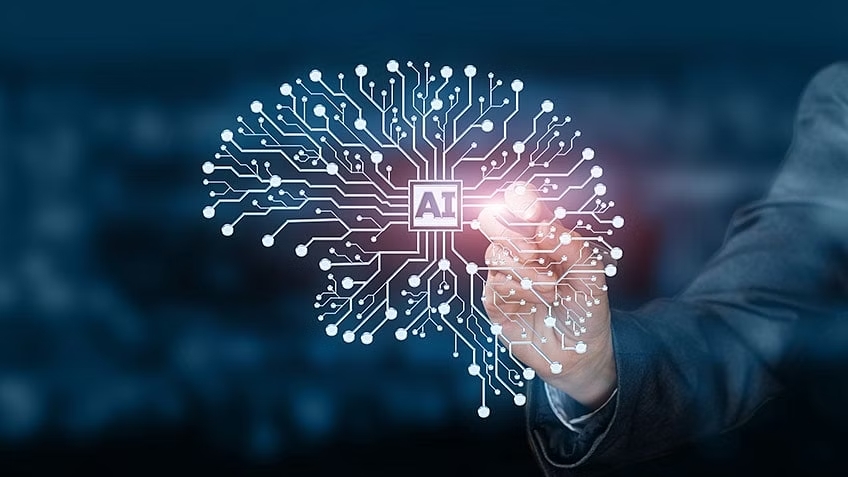Artificial Intelligence (AI) is reshaping our world. But what is artificial intelligence exactly? AI essentially refers to the simulation of human intelligence processes by machines, especially computer systems. It involves acquiring information, the rules for using it, and self-correction. In this blog, we’ll delve into the intricacies of AI, exploring its applications, benefits, limitations, potential future impact, and how you can take an online AI course to launch a career in this exciting field.
What is Artificial Intelligence?
Artificial Intelligence (AI), often considered as the frontier of technology innovation, is a branch of computer science that aims to simulate human intelligence into machines. At its core, AI is about creating systems that can perform tasks requiring human intelligence, such as understanding natural language, recognizing patterns, solving complex problems, and making decisions. AI can be classified into two main types: narrow AI, designed to perform a specific task, such as voice recognition, and general AI, which can perform any intellectual task a human being can do. Utilizing machine learning and deep learning techniques, AI systems can learn from data, improve from experience, and mimic human intelligence to a remarkable degree. The remarkable capabilities of AI have paved the way for advancements in various sectors, from healthcare and education to finance and climate change mitigation, revolutionizing how we live and work.
What is Artificial Intelligence, and What Are the Benefits of AI?
Artificial Intelligence is revolutionizing how we work, live, learn, and interact. One of the primary benefits of AI is its ability to automate repetitive tasks, increasing efficiency and freeing up time for humans to focus on complex problem-solving and innovation. AI can analyze massive amounts of data faster and more accurately than humans, making it invaluable in weather forecasting, financial modeling, or medical diagnosis.
Furthermore, AI can optimize business logistics and supply chain management, predicting demand trends and allowing for better resource allocation. On a societal level, AI has the potential to help address significant challenges, from climate change to healthcare. By predicting weather patterns, AI can help us prepare for natural disasters. AI can predict outbreaks or personalize medicine in healthcare, tailoring treatment to individual genetic codes.
Despite the challenges and controversies surrounding AI, it’s undeniable that its benefits could be far-reaching, revolutionizing industries and potentially bringing about a new era of human progress.
Real-World Artificial Intelligence Examples
Artificial Intelligence (AI) is transforming various industries and streamlining business operations in innovative ways. In the healthcare sector, AI predicts disease outbreaks, develops personalized treatments, and assists in medical imaging, leading to more accurate diagnoses and better patient outcomes.
The finance industry is leveraging AI for fraud detection, risk management, and providing personalized customer experiences. Machine learning algorithms are used to analyze patterns in spending behavior, aiding in identifying fraudulent transactions. Moreover, AI’s predictive capabilities help forecast market trends, guiding investment strategies and risk assessments.
In the transportation sector, AI powers self-driving cars, optimizing routes, and improving safety by minimizing human error. AI also plays a significant role in the retail industry, from improving supply chain efficiency to personalizing customer experiences through recommendation systems.
Lastly, AI assists in personalized learning, adaptive testing, and automating administrative tasks in education, making the learning experience more engaging and efficient. These real-world applications of AI demonstrate its potential to reshape our world and redefine how we live and work.
Top Types of Artificial Intelligence
- Reactive Machines: These are the most basic types of AI systems which do not have the ability to form memories or use past experiences to inform current decisions. They react to current stimuli and can’t learn from the past. An example is IBM’s chess-playing supercomputer, Deep Blue.
- Limited Memory: This type of AI can use past experiences to inform future decisions. Most AI systems today fall into this category. Self-driving cars are a great example as they continually observe other cars’ speed and direction to make informed decisions.
- Theory of Mind: This category of AI, while not fully realized yet, would be able to understand that others have their own beliefs, desires, and intentions that influence their decisions. This would allow AI to understand and interact with humans fully.
- Self-Awareness: This is the most advanced type of AI where machines have a sense of self and consciousness. These machines will be able to predict the feelings of others and learn from their own experiences.
Each type of AI has unique uses and potential in various sectors. As we progress in AI development, we may witness a broader integration of these AI types across industries.
Strong AI vs. Weak AI
When answering the question, “What is artificial intelligence” it’s crucial to distinguish between Strong AI and Weak AI, as they represent different levels of machine intelligence.
Strong AI, also known as General AI, refers to systems that possess the ability to perform any intellectual task that a human being can. They can understand, learn, adapt, and implement knowledge in a way that closely mirrors human intelligence. If we ever possess machines that can fully understand and learn from their experiences, they would fall under this category. However, it’s important to note that this level of AI is purely theoretical at this point.
On the other hand, Weak AI, also known as Narrow AI, represents AI systems that are designed and trained for a specific task. These systems can’t surpass their programming, meaning they don’t possess the ability to understand or learn beyond their functionality. A classic example of weak AI is a recommendation system, like those used by Netflix or Amazon.
The main difference between these two forms of AI is their capabilities. While a strong AI can potentially perform any intellectual task a human can, a weak AI is limited to the specific task it was trained for. Moreover, strong AI involves a form of consciousness and self-awareness, whereas weak AI operates under the limits of its programming without understanding or consciousness.
Machine Learning vs. Deep Learning
While machine learning (ML) and deep learning (DL) fall under the broad category of Artificial Intelligence, they have significant differences. Machine learning is a method of data analysis that automates the building of analytical models. It employs algorithms that learn from data, enabling systems to make decisions without explicit programming. On the other hand, deep learning, a subset of machine learning, uses artificial neural networks with multiple abstraction layers to simulate human decision-making.
The primary difference between the two lies in their approach to data interpretation. Machine learning algorithms typically improve their performance as the number of samples within the dataset increases. However, they still rely heavily on feature extraction performed by humans. In contrast, deep learning algorithms attempt to learn high-level features from data, minimizing the need for human intervention. This key distinction makes deep learning particularly valuable for solving complex problems where manual feature extraction would be challenging, such as image recognition, natural language processing, and speech recognition.
What is Artificial Intelligence, and What Are the Limitations of AI?
Despite the impressive advancements and widespread applications, Artificial Intelligence (AI) does come with its own set of limitations. For one, AI machines and systems are bound by the data they are trained on and lack the ability to think creatively or out of the box. This leads to an inherent bias in the system since the AI can only make decisions based on its training, which may not be completely free from human prejudice or error.
Moreover, AI systems can be expensive to build and maintain, requiring extensive resources for data storage, processing power, and technical expertise. It is also worth mentioning that these systems are not completely autonomous, requiring human intervention for decisions that need emotional intelligence and ethical judgment.
Another significant challenge is the issue of security and privacy. With AI systems processing vast amounts of personal and sensitive data, there is a potential risk of data breaches and misuse. Lastly, an over-reliance on AI could lead to job displacement in specific sectors as tasks become increasingly automated.
In conclusion, while AI holds significant promise for revolutionizing various sectors, these limitations highlight the need for careful consideration and responsible implementation.
The Future of AI
As we navigate through the 21st century, the future of Artificial Intelligence (AI) looks promising and holds vast potential. It is anticipated that AI will continue to advance at an unprecedented pace, further embedding itself into our daily lives and business operations. One of the most exciting prospects lies in ‘Deep Learning,’ where machines could improve their understanding and functionality based on the data they process, enabling them to make more refined and accurate predictions.
We can expect AI to revolutionize diagnostics, patient care, and pharmaceutical research in the healthcare sector. Similarly, AI-powered predictive analytics could provide valuable insights into business, enabling companies to target their marketing strategies more effectively and make informed decisions.
On a societal level, AI could bring transformative changes in areas such as environmental conservation, disaster management, and law enforcement, to name a few. However, alongside these opportunities, the evolution of AI also poses challenges and ethical dilemmas, such as job displacement due to automation and the potential misuse of advanced AI. Therefore, it is essential that as we move towards a more AI-integrated future, we develop robust ethical guidelines and regulatory frameworks to ensure the responsible advancement and use of AI.
AI Is Here To Stay, and Certified Professionals Are in High Demand
In conclusion, Artificial Intelligence is no longer a distant concept but a present reality with the potential for unprecedented growth and influence on our societies. It shapes the future across multiple sectors, promising profound improvements in our daily lives, business operations, and societal structures. However, AI’s ethical conundrums and challenges necessitate a cautious and responsible approach.
For professionals looking to stay ahead of the curve, acquiring certification through an online AI course will provide a thorough understanding of this complex field and equip them with the tools to navigate, contribute, and make informed decisions in this AI-driven era. These courses offer the flexibility of learning at one’s own pace and the opportunity to study with experts in the field, making it an ideal choice for professionals seeking to expand their horizons. Embrace the future, and let the journey into the world of AI begin today.







